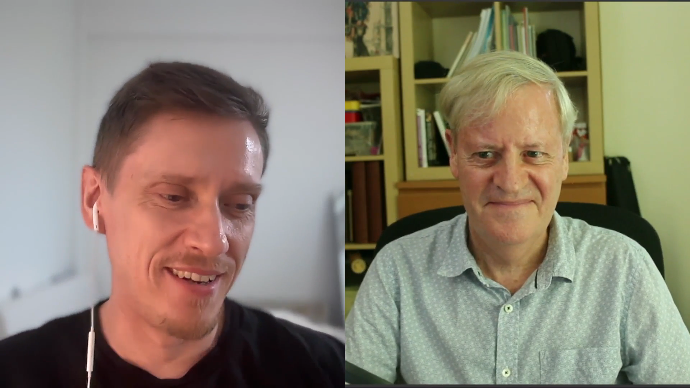Jon Scheele (00:00)
Jed, really pleased to meet you here at Web Summit in Lisbon.
Jed Ng (00:04)
For sure, all the places we run into each other, Jon. Good to see you. good to see you.
Jon Scheele (00:10)
You've been a speaker here. Actually, you should introduce yourself a little bit because you've been in the angel investing area for some time and Web Summit is a really good place to see both the investing side and the startup side. Can you tell us why you came here?
Jed Ng (00:31)
Sure. In a former life, as you know, I used to be a tech operator and we helped build the world's largest API marketplace with rapid API.
From there I turned angel investor. Today I run my own angel network and we do syndicated deals. We've got 1300 to 1400 investors around the world. We cut half a million up to million dollar cheques into startups and my latest venture is angelschool.vc. We're an accelerator for angel investors so helping them learn the skills of venture and to help emerging syndicate leads build and run their own angel networks.
Jon Scheele (01:07)
So building that network, that community of people who are interested in angel investing themselves or building syndicates, that's very, very broad. In terms of your own investment, a lot of investors have their own filters that they apply based on the sort of businesses that they know. What are the filters that you apply when you look at investments?
Jed Ng (01:29)
So that's a great question. From a first principles point of view, I do believe every investor should have a focus thesis, which is part of the reason why we help other angels get into this game, because we want diversity of capital and interest in the ecosystem. What I focus on is B2B technology and software. We invest in seed plus companies up to series A or B, and we'll look across the US, Western Europe, and Southeast Asia.
Jon Scheele (01:56)
I guess your B2B focus and your industry focus is quite clear, but geographically that's very diverse. I guess you've worked across all those geographies, so you have an understanding. What are some of the things that you would say to a startup that may have started in one region and is looking at expanding to another?
Jed Ng (02:17)
I'll talk about this from an investor point of view.
If you're a startup and you're looking to be venture backed, you really need to think about getting an exit for your investors in order to be appealing, which basically means thinking about market sizing. You don't necessarily have to be operating in a market today where you can exit, but you need to have a clear plan to get out. So I think this is a really interesting conversation when we look at the markets like Europe or even Asia.
To be honest about it, the US has a certain privilege on its own of being a very big single market. When we look at Europe, it's a collection of states, and in Southeast Asia or Asia, it's even more fragmented. The cultural challenges, regulatory, currency, all of these things amplify a lot.
So it's very important that the companies have a plan towards getting there and we believe in the founders to execute to become big enough for them to be successful for us.
Jon Scheele (03:17)
So would you say a company that started in one region, at what point do they need to develop that sense of understanding of the other regions? Because as you say, in the US a company can grow quite a lot, before they outgrow, or not even. They may not even outgrow the US. in Europe, when you look at different smaller markets, and in Southeast Asia and Asia generally, you see a lot of smaller markets. And the size of each market may not be enough to sustain the business model on its own. But going to another country, with the different cultural business norms, different regulations, how does a startup navigate that? Do they look for partners? What are the skillset that they're going to have to acquire and where are they going to get that from?
Jed Ng (04:09)
I don't think there's a hard and fast answer. It is very case by case. So let's break this down into parts. When we look at market sizing, a company going from one market to the other, when does that happen?
A lot of it is a forcing function depending on where they operate. So think about a really small market like Israel. Every company that is founded there knows that they need to get out of the market. And the natural next stop for them is the US. So we tend to find that companies that operate in really small markets, they think ahead and long term out of necessity from day one. There's a little bit of...
It's not quite the right term, almost a middle income trap. Like if you take Europe, a market like France or Germany could be big enough for the company to be successful or maybe not, right? It depends. But because of that opportunity to stay domestic, and there are also cultural reasons, the companies might delay taking that decision, right? So it gets to be a little bit tricky.
Jon Scheele (05:04)
So for Singapore... which is a very advanced market but it's also a limited size market. So a company that starts there has to be thinking Southeast Asia, other advanced economies in the region like Australia.
What should be in the back of a founder's mind as they contemplate that?
Jed Ng (05:29)
Yeah, just to double-click on this point, Singapore is a really interesting example. There's a very big push for innovation, digitization. I think Singapore will be a leader in the region. To drive forward is going to be the hub for capital. Now that said, if we're being honest, Singapore also has several big disadvantages for fostering startups. One is, it's a physically small market. If I'm evaluating a company for its potential to get to a hundred million dollar top line, it's very hard to find the right business that can do it within Singapore. And if they're forced to go outside of Singapore, every country is so drastically different. Singapore is on...
It's kind of an island on its own, like its characteristics are unlike anything else within Asia. And maybe the most natural point is actually Australia. So for a company to go from Singapore to another market, it's almost like setting up a whole new company. And I think just to add to build on this point, I think it's very hard to drive innovation and sustain that in a very comfortable environment where there are lot of opportunities and there isn't as much of an economic push for survival that drives innovation. So I think those are some of the challenges that Singapore will have to confront.
Jon Scheele (05:44)
So I guess there are certain stages as companies grow. So if you're happy to operate at a fairly small level or start at a fairly small level, then Singapore can be a great place to start, particularly given the rates of digitalisation and adoption of new technology. But then there's sort of step changes that you have to take. Once you've said, really I need to go broader geographically, then there's as you say, a step-changing capability that you need.
Jed Ng (07:18)
Definitely.
Jon Scheele (07:19)
So what are the things that you typically see companies do when they reach that stage of having to go broader? Do they hire more staff or do they partner with other firms? Do they look for local partners in the regions? What are some of the things that you see as the most successful?
Jed Ng (07:36)
Before we get into conversations with a company and we look at this from a market sizing point of view, I actually want a clear plan beyond the market that where you are operating in today. Could be Singapore, could be another market. What is the next one that you're going to? And within this, is there that path to that $100 million top line that can make you big enough? Because we actually would prefer that you didn't have to enter seven different markets.
I think in Asia particularly, companies have to have a certain level of maturity and to be careful and deliberate about when to enter the market. There is a balance of course. At the early stage, you might experiment, you might work with partners to fill out the market, develop your channels, maybe work with partners to try and get product in market, get some feedback before you go in.
I do think that companies do need to invest and build a team on the ground when they're ready and internalize that capability rather than having a dependency on a third party because in a lot of these markets there are some very practical challenges.
Control and ownership of your local entity. Many of these markets will require startups to have a local director. And so is it, and what if that local director has 51 % control? They effectively have control of your bank accounts and all of these things, which is why I strongly believe in like, hey, you gotta internalize that, take control of that, and remove dependency risk. And that requires a certain level of maturity.
Jon Scheele (09:03)
Very interesting. So looking back at Web Summit, probably people arrive from all over the world and some of those companies are interested in expanding into Asia. What are the things that you would recommend to a European or a North American startup that's got its eyes on Asia?
Jed Ng (09:26)
I'd say you need to think about the nature of your product and service and if there's a fit and a natural corridor between Europe and Asia. Intuitively, I don't know what that is, but it's got to exist. I like the narrative that you're positioning that you can work with partners to test the market cheaply. The same way a startup would operate to experiment. Do that first before you start doubling down.
I think that market expansion has to be a very deliberate, well thought out and executed plan, otherwise it's a recipe for failure by and large.
Jon Scheele (09:58)
Well on that note, thanks very much Jed, I learned a lot and enjoy your time at Web Summit.
Jed Ng (10:04)
My pleasure, thanks for having me Jon.





